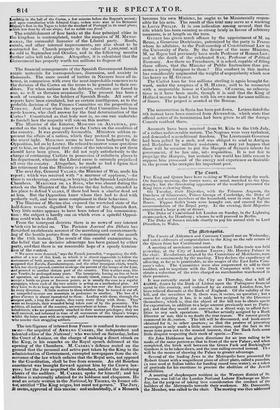The financial arrangements of the Spanish Government furnish ample materials
for correspondence, discussion, and anxiety to thousands. The mere record of battles in Navarre loses all in- terest, in comparison with even the most improbable rumours as to the decision of the Cortes on the terms to be granted to their cre- slitors. For when nations are the debtors, creditors are forced to sue, as well as threaten occasionally. The present has been a %reek of vexation to the holders of Spanish Bonds. All sorts of reports have been circulated, but no certain intelligence, as to the probable decision of the Finance Committee on the proposition of TOREN°. And even when the report of that Committee has been !Made known, who shall answer for the final determination of the Cones? Constituted as that body now is, no one can undertake to foretell how the majority will vote on this matter.
The Minister of the Interior, MOSCOSO DE ALTAMIRA, pre- sented on the 14th a long report to the Cortes on the condition of the country. It was generally favourable. Ministers seldom re- present the affairs of a nation, which they pretend to govern, in the worst light. Moscoso seems to have been badgered by the Opposition, led on by LOPEZ. He refused to answer some questions put to him, on the ground that notice of the intention to put them should have been given. He did not reply satisfactorily to the charge of continuing Carlists in possession of subaltern places in his department, whereby the Liberal cause is seriously prejudiced all over the country. Altogether, he made so bad a figure that his retirement from the Ministry is anticipated.
The next day, General VALDEZ, the Minister of War, made his report ; which was received with "a murmur of applause,"—for there is no cheering, crowing, or braying, in the Spanish Legislative Chambers. MARTINEZ DE LA ROSA, who was absent during the attack on the Minister of the Interior the day before, attended in his place to defend VALDEZ, if there had been a similar dead set at him. But the Opposition knew whom they had to deal with perfectly well, and were more complaisant in their behaviour. The Minister of Marine also exposed the wretched state of the half-dozen vessels dignified by the name of the Spanish fleet. Very little notice appears to have been taken of his communica- tion : the subject is hardly one on which even a spiteful Opposi- tion could wish to dwell.
From the insurgent districts there is no news of any interest Which can be relied on. The Parisian Journal des Debuts has furnished an elaborate account of the marching and countermarch- ing of the hostile parties from the commencement of the month to the 19th instant. The result of this careful examination is, the belief that no decisive advantage has been gained by either party, and that there is no reasonable hope of a speedy termina- tion of the contest.
" We never were deceived," says the French journalist, "respecting the diffi- culties of a war of this kind, in which it is almost impossible to follow the 'movements of both armies, on account of their irregularity; and we always supposed that Zavala, Zumalacarreguy, and the other insurgent chiefs, would, when too closely pressed, contrive to escape the pursuit of the troops of the Line, and proceed to another distant part of the country. This warfare may, like our Vendee, be prolonged many years. The insurgents, having no line or basis iof operation, no places to cover, as we already stated, cannot be compelled to accepta battle on given or foreseen points, as is- usually the case in a regular campaign, where each of the two armies is acting on a methodical plan. All they have to do to keep up the insurrection, is to run over the four provinces in every direction. It little matters to them whether they be turned or cut off, In compelled to cross one mountain in preference to another. The loss of a place tfartnes is almost immaterial to them. Leading with them, through the steepest path, a long file of mules, they carry every thing with them. The?' want no hospitals, their wounded being taken care of by the peasantry. The soldiers, all natives of the country, are everywhere at home. Protected by the inhabitants, who are passionately attached to their ancient privileges ; they are well received, and informed in time of all movements of the Queen's troops; whilst the latter meet with no sympathy, and have to encounter silent enemies, 'who murder their straggling soldiers.


















 Previous page
Previous page